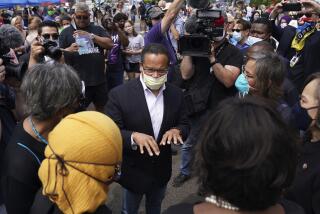Broad Attack on Poverty Proposed : Report: A group of private sector leaders calls for ‘a new commitment’ to expanding the nation’s minority middle class.
- Share via
WASHINGTON — A task force of corporate and academic leaders appealed Tuesday for “a new national commitment” to supporting a growing minority middle class and assisting an impoverished underclass, but offered few specifics and no financial proposals for achieving the ambitious goals.
The Business-Higher Education Forum, a coalition of more than 90 chief executives of Fortune 500 firms and prestigious U.S. colleges and universities, said in its report that the failure of poor blacks and Latinos to thrive in the workplace “will require concerted efforts by the full range of our institutions--federal, state and local governments; colleges and universities and the nation’s corporations.”
In a news conference called to unveil the 85-page report, “Three Realities: Minority Life in the United States,” forum officials lauded middle-class blacks and Latinos who are “making it” in American society, but lamented that nearly two-thirds of all minorities are “at the margin” or already among “the poor and the underclass.”
Among the forum’s findings:
--More than a third of all blacks and Latino citizens are middle class. Some 36% of black families have annual incomes of $25,000 or more, and 40% of Latino families are in that income bracket, compared to about 60% of white families.
--Between 25% and 30% of all minorities are semiskilled or unskilled workers who are just a paycheck or two away from slipping into poverty.
--About a third of all minorities live in persistent poverty, and that proportion is escalating rapidly. The poverty rate among black families was nearly three times that of whites in 1986. From 1970 until 1980, the number of poor people in the country’s five largest cities rose 161%.
--Minorities are held back by racism, poor education, limited business opportunities and “the stranglehold of the inner city” that stifles expectations.
Clifton R. Wharton Jr., co-chairman of the forum’s task force on minorities and the workplace, said that corporate and academic leaders have become concerned because blacks’ and Latinos’ being stuck at the bottom of the economy threatens the nation’s standard of living and ability to compete on a global scale in the future.
“Over the next 10 years, over 40% of the new entrants into the work force will be immigrants and minorities,” said Wharton, who is chairman and chief executive officer of Teachers Insurance and Annuity Assn. of America and the College Retirement Equities Fund, a New York-based private pension fund for professors. “Unless they come fully into the economic and civic mainstream,” he said, “U.S. business and industry won’t have the men and women needed for an energetic and productive ecomony.”
Wharton and Steve C. Mason, another co-chairman of the task force, pointed to the report’s broad and unspecific array of recommendations for public and private efforts to help poor minorities navigate their way upward.
Among the proposals are increasing spending for public jobs and training programs, restructuring the welfare system, expanding government involvement toward preventing teen-age pregnancy, passage of federal laws to attack education problems in low-income communities, increasing spending on student-assistance programs and expanding corporate affirmative-action efforts.
When questioned about how the nation could afford such social initiatives, Wharton and Mason sidestepped the issue of whether they would require new taxes or specific cuts in other federal spending.
“Clearly, these recommendations are expensive,” said Mason. “We do not have a totally definitive set of recommendations” as to how to pay for them.
Mason said that the forum did not poll its members as to whether they would support raising taxes to pay for following the report’s proposals. He said that a majority of the membership would be willing to pay higher taxes to ensure a productive economic future for poor and unemployable blacks and Latinos.
“I can’t speak for all the top executives in the country, I can only really speak for one,” said Mason, who is president and chief operating officer of The Mead Corp., an Ohio-based forest and paper products company.
“My conviction is that these issues are important enough that they have to be funded.”
More to Read
Sign up for Essential California
The most important California stories and recommendations in your inbox every morning.
You may occasionally receive promotional content from the Los Angeles Times.













